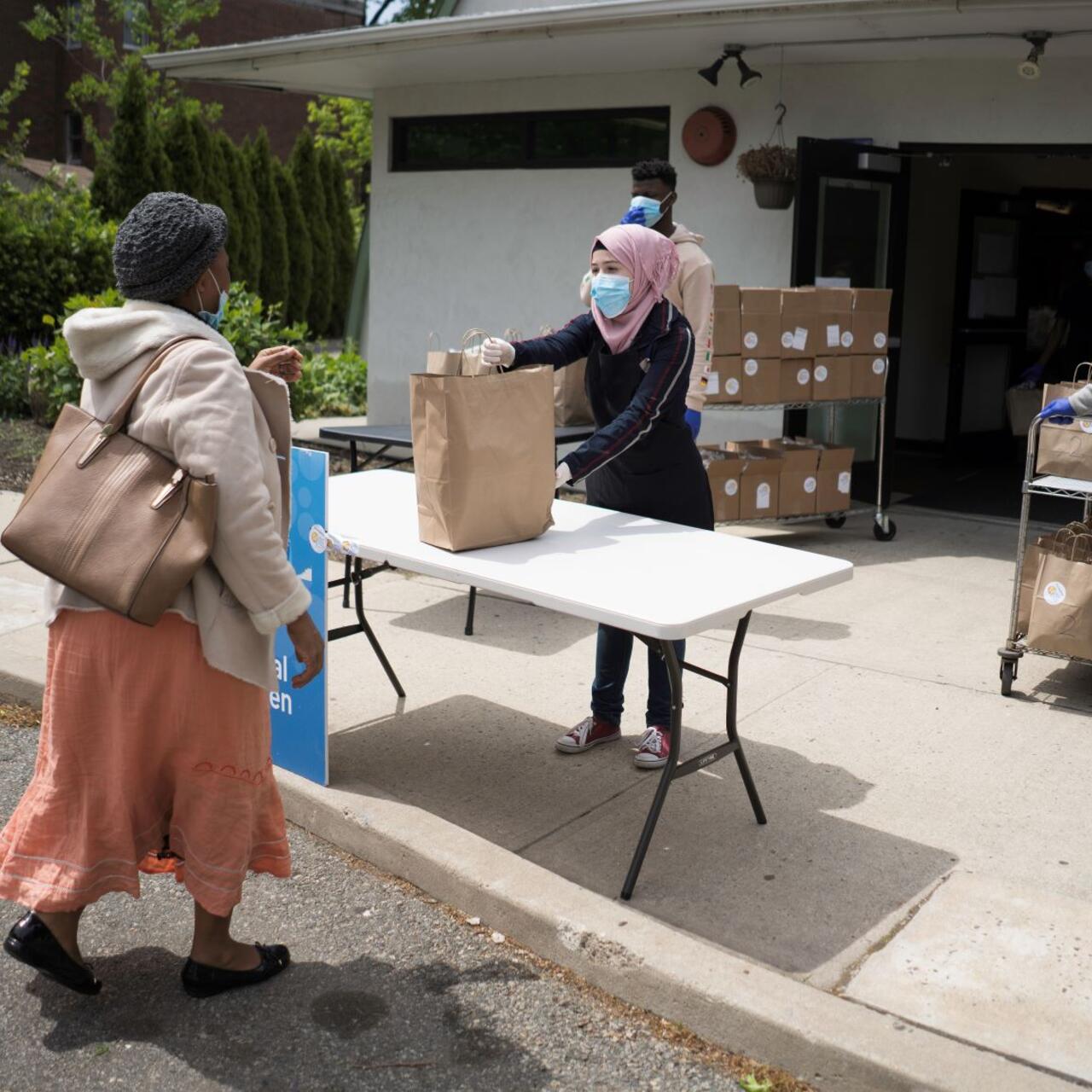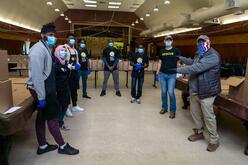
IRC and World Central Kitchen feed thousands during COVID-19
Staffed by refugees, the nonprofits’ distribution centers provide meals to families in need.

Staffed by refugees, the nonprofits’ distribution centers provide meals to families in need.
When the novel coronavirus put most of the United States under stay-at-home orders, staff at the International Rescue Committee knew that their jobs were about to change dramatically. While refugees have played a large role in fighting the virus as essential workers, they have also been among the hardest hit by the economic fallout of the pandemic. Priorities had to shift from resettling new Americans to helping clients access basic needs. Food was one of the most urgent concerns.
“When COVID-19 hit, our clients—like many Americans—started losing employment,” says Brittany O’Neill, development director for the IRC in New York. “We knew that one of their biggest concerns would be getting food on the table.”
The IRC in New York and New Jersey found an answer in a partnership with an organization expert in getting hot, nutritious meals to communities in need: Chef José Andrés’s World Central Kitchen (WCK).
Together, the two nonprofits built distribution centers that would provide IRC clients and the broader community with more than nourishing meals. By hiring local refugees to staff the quickly growing centers, the project also provided safe employment for refugees in the community.
Chef José Andrés founded WCK in 2010. The organization rose to prominence as a leader in the nonprofit space after serving 3.7 million meals to people in need in the aftermath of Hurricane Maria in Puerto Rico. WCK has responded to emergencies across the world and the U.S., including in Haiti, Peru, California, Indonesia, Guatemala, Mexico, Florida, Nebraska, Colombia, Venezuela and more.
“Let’s invest in longer tables and shorter walls,” Chef Andrés says, summing up his philosophy.
With its experience responding to disasters and emergencies, WCK understands how to move rapidly when crises strike—key to its partnership with the IRC. “When you talk about hunger and thirst, you need to be quick,” Chef Andrés says.
For its part, the IRC had the connections in the community to identify people in need as well as safe and appropriate sites to distribute the food. And with so many out of work, IRC clients—many of them refugees in need of safe employment—were hired to staff the project.
Jas Verem, the education and learning supervisor for the IRC in Elizabeth, N.J., manages one of the distribution centers. He sees the refugees on staff as critical to the project’s success.
“We were able to staff fairly easily and quickly with our clients who were willing to work,” he says. “Especially in the early stages of isolation and quarantine, they jumped at the opportunity to help out.”
Many IRC clients have language skills that have proved essential in the diverse New York City metro area.
“Many of our clients speak multiple languages,” says O’Neill. “Being able to provide that sort of linguistic capability to their community and their neighbors was an important value add.”

Nineteen-year-old Rania Abou is one of the IRC clients who embraced the opportunity to help her community. A refugee from Syria living in New Jersey, she was studying for her GED when the virus began spreading.
“If I can help, I should help,” Rania says. “In the future, somebody will help me. It's like a circle. I help somebody and somebody helps me.”
Anyone who needs that help is welcome at the distribution centers—not just refugees—something Rania sees as a strength.
“When people who need the food come, we give the food to all without asking them their name or ID or anything like that. We just ask them how many people in their family and give them the food.”
Adds Rania, “When I see the kids smiling, I feel happy. And that's given me hope.”
The pandemic is not over, and people across the country continue to struggle to put food on the table.
As the need continues, WCK and the IRC are growing their partnership. In May, the organizations collaborated in Washington, D.C. to provide meals for IRC clients out of WCK's D.C. operation in the Nationals’ baseball stadium just south of the Capitol. WCK also visited the IRC’s Welcome Center for asylum seekers in Phoenix, Ariz., and is exploring the idea of reviving the dormant commercial kitchen, among other projects.
As for the New York and New Jersey area, the program continues with some modifications even as the city begins to reopen. One change intended to help recipients adjust to the “new normal”: transition from prepared meals to groceries.
“A lot of clients were responsive to being able to start preparing meals that they were more familiar with,” says O’Neill. “Something as simple as being given groceries instead of a prepared meal was a really big shift.”
Whatever form the partnership takes in the future, its impact has been powerful.
“Food is this one huge unifier,” says Verem. “It cuts across boundaries, it cuts across cultures. It brings people together.”